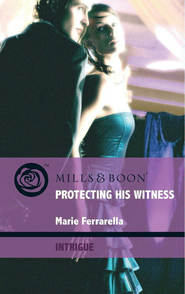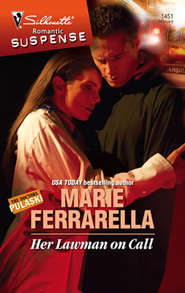По всем вопросам обращайтесь на: info@litportal.ru
(©) 2003-2024.
✖
Adding Up To Family
Автор
Год написания книги
2019
Настройки чтения
Размер шрифта
Высота строк
Поля
“Well, aside from the fact that I had all sorts of questions about what was happening to my body, questions I couldn’t put into words, and even if I could, I think my mother was too embarrassed to answer—”
She could see by the light that came into Stevi’s eyes that although she was resisting, Becky had guessed correctly. She continued, confident that there was more to the girl’s dilemma than what she had just stated. “—I was also smarter than all the other kids who were my age.”
Stevi’s eyes widened. She hadn’t been expecting that.
Bingo, Becky thought.
“How much smarter?” Stevi asked, eyeing her suspiciously.
“Well, for one thing, I skipped a lot of grades,” Becky told her, observing the little girl’s face as she made each response.
Stevi cocked her head, as if that would help her judge whether or not this woman was telling her the truth. “How many grades?” she challenged.
This was definitely not a trusting child, Becky thought. But that was all right. Neither had she been at Stevi’s age, she recalled. That was because she had endured being teased and ridiculed by kids who were ultimately older than she was and who, scholastically, she had left behind. She remembered being ashamed of how smart she was, thinking of it as a burden and a curse instead of a blessing. She found herself wanting to save Stevi from that.
Becky debated saying anything further to Steve’s daughter. When Celia had told her about this job and had mentioned that Stevi was precocious and exceptionally bright, Becky had decided not to mention graduating college at a young age until she’d had a few days to get the girl acclimated to her. But already she was beginning to change her mind.
She wasn’t ashamed of the fact that she’d been so young when she’d achieved so many milestones, and she didn’t want Stevi to feel ashamed of that, either.
“Most people graduate college when they’re twenty-two or twenty-three—” Becky began.
“I know that,” Stevi said, cutting in. And then, pressing her lips together, she eyed her with curiosity more than suspicion. “How old were you when you graduated?”
The girl had realized where she was heading with this, Becky thought. Most ten-year-olds wouldn’t have. She was right; they had more in common with each other than the little girl thought.
“I was eighteen,” Becky stated.
For the first time, Stevi’s bravado slipped just a little, allowing the young, vulnerable girl beneath to show through. She looked at this new housekeeper, clearly impressed. “Really?”
“Really,” Becky responded.
Stevi fell silent for a moment and Becky thought that maybe she didn’t believe her. The look on her face was nothing if not suspicious.
But then, after a moment’s hesitation, the girl asked, “Um, did the other kids—the older kids,” she clarified. “Did they make fun of you?”
“Some of them did,” Becky admitted. “A lot of them, in fact. When I got older, I realized that was because they didn’t know what to make of me. Later on, some of them admitted that they felt bad that they couldn’t keep up to me, but you know, everyone’s different and everyone has a different talent inside of them, a different gift.
“They just needed to concentrate on that instead of being angry at me because I got better grades than they did and I could finish tests faster.” Becky paused for a moment, letting the words sink in. When she saw the furrows on Stevi’s brow, she decided to delve a little into her life. “Do other kids make fun of you?”
“No!” Stevi answered quickly.
And then, because it was a lie, she relented a little. “Maybe.”
Not feeling comfortable with that answer, either, she finally sighed deeply and then grudgingly admitted, “Yes.”
Becky nodded. “You realize that they’re acting angry at you because that’s a lot easier to do than finding fault with themselves.”
Stevi regarded her doubtfully. And then, because Becky wasn’t backing off, she asked uncertainly, “Really?”
“Really,” Becky told her with solemn conviction. “Trust me. Years from now, if any of those kids have a brain in their heads, they’re going to realize that they were being very unfair to you, when what they should have been doing was studying harder so that they could get those grades they were so envious of. Or better yet, studying with you and trying to find out just how you were able to manage doing so much better than they did.
“Right now,” she continued, “you probably feel like you’re all alone, but that’s going to change, I promise. And most of all, you’re going to be the girl who makes it, who becomes somebody, while they, if they don’t start changing and actually applying themselves to their schoolwork, are just going to wind up fading into the background, while you do great things.”
She could see by Stevi’s expression that the girl wanted to believe her, but still wasn’t sure if she could, or if this was just a lot of talk this new housekeeper was trying to sell her.
“You think so?”
Without a single shred of hesitation, Becky stated, “I know so.”
Stevi still wasn’t 100 percent sold on what she was saying. “But if you were so smart, how come you’re a housekeeper? How come you’re not doing something...bigger?” she finally said, for lack of a better word to describe what she was trying to get across.
“Well, I wasn’t always one,” Becky confided. “You know what I was before I decided to take a break and become a housekeeper?”
Confusion and curiosity furrowed the girl’s brow again. “No—what?”
Becky smiled. Her past life seemed like a million miles away now. “I was an engineer.”
“Really?” Stevi questioned, a little unclear on how the woman she was talking to could have been one and then the other. The two professions seemed light-years apart.
“Really,” Becky assured her.
“Can you do that?” Stevi asked. She was thinking about her father. “Can you just stop being an engineer and become a housekeeper?”
“I did,” Becky responded.
“But why would you do that?” Stevi demanded. Her father was totally dedicated to doing what he did, sometimes to the point of staying at work for long hours and coming home after she’d gone to bed. “Didn’t you like being an engineer?”
“In the beginning, I did. Very much so,” she told Stevi. “But after a while I decided that maybe the pressure was too much. I found I was always working and that it wasn’t fun anymore, not like it used to be. So I decided to take a break for a bit and just smell the roses.”
“So is that what you did?” Stevi asked, doing her best to understand what this adult was telling her.
She liked the fact that Becky was talking to her as if she were another grown-up rather than just a little kid. Too many adults treated her as if she couldn’t understand things. Her father wasn’t like that, but lately, communication between them hadn’t been going very well. Like an old train with a faulty wheel, it kept breaking down.
“Did you go smell roses?” she pressed.
“Yes,” Becky answered. “I took time to enjoy the things around me.”
“And being a housekeeper lets you do that?” Stevi was still somewhat unclear about the concept.
“Well, until now, I’d come to different houses, race around cleaning them up and then go home. This will be my first live-in position. So, like I said earlier, I’m counting on you to help me navigate this whole new career change. I’d like to be the best housekeeper that I can be,” she confided. She looked at Stevi. “So, can I count on your help?” she asked, holding out her hand.
Stevi looked at it, and after a moment, she grinned broadly and put her hand into Becky’s, shaking it.
“Yes!” she declared, doing her best to sound grown-up. “You can.”
Chapter Four (#u1baf05f1-0529-5033-8ad9-f355e0b4b63d)
Steve left work early, which was to say that he actually left on time. As usual, there was enough work on his desk to keep him busy until well after seven o’clock, but since things were still up in the air at home, he thought he should be there at a reasonable time—just in case. After all, this was Rebecca’s first day with Stevi and he didn’t want to take any chances on things going wrong.











